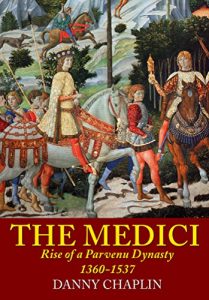In the affluent but militarily weak city of fifteenth and sixteenth-century Florence, an ambitious family of financiers from a modest provincial country background rose through shrewdness and wealth to ultimate command of the state. Eventually, the House of Medici would lend its Tuscan mercantile bloodline to the royal dynasties of France, Spain, Austria and England. Their astonishing story is inextricably intertwined with that of Florence itself. Using their artistic patronage of such geniuses as Michelangelo, Leonardo da Vinci, Brunelleschi, Donatello, Pontormo, Titian and Vasari to legitimise and propagandise their regime, they inadvertently triggered the Florentine Renaissance in Italy which later spread throughout the whole of Europe and dragged the world out of the middle ages.
This epic new narrative history of the Medici, which covers the crucial period from 1360 to 1537, charts the family’s meteoric rise from the humble, unassuming beginnings of Giovanni di Bicci, to Cosimo de’ Medici (Pater Patriae) and his battle with Rinaldo degli Albizzi. It progresses to Cosimo's son Piero ‘the Gouty’, his grandson Lorenzo ‘il Magnifico’ and the golden age of Laurentian Renaissance Florence, touching upon the treachery of the Pazzi Conspiracy, the family’s expulsion and exile from Florence under Piero ‘the Unfortunate’ and the Medici’s subsequent restoration to power under the two notable but deeply flawed Medici popes: Leo X and Clement VII. Ultimately this grand narrative culminates in the brutal assassination of Duke Alessandro de’ Medici and the ascendancy of Cosimo I, Grand Duke of Tuscany, who would establish total Medici hegemony over Florence for the ensuing 168 years.
Examining the family’s rise and the specific strategies and mechanisms by which they gained and maintained absolute political power, their saga is also placed within the wider context of the history of other principal Renaissance Italian states including Milan, Venice, Rome and Naples and offers a sweeping overview of the disastrous Italian Wars of 1494-1559. Many of the most illustrious personalities of the Italian Renaissance are also examined from an intimate perspective including, amongst others, Francesco Sforza and his descendants, Girolamo Savonarola, Cesare Borgia, Niccolò Machiavelli, Francesco Guicciardini, Baldassare Castiglione and the Emperor Charles V. Such notorious Renaissance popes as Sixtus IV, Pius II, Paul II, Alexander VI, Julius II and Paul III also play a prominent role in this gripping narrative. Danny Chaplin presents a rich and enthralling pageant of all the key secular, ecclesiastical, artistic and humanist personages who were associated with the lives of this most remarkable Italian family.
This epic new narrative history of the Medici, which covers the crucial period from 1360 to 1537, charts the family’s meteoric rise from the humble, unassuming beginnings of Giovanni di Bicci, to Cosimo de’ Medici (Pater Patriae) and his battle with Rinaldo degli Albizzi. It progresses to Cosimo's son Piero ‘the Gouty’, his grandson Lorenzo ‘il Magnifico’ and the golden age of Laurentian Renaissance Florence, touching upon the treachery of the Pazzi Conspiracy, the family’s expulsion and exile from Florence under Piero ‘the Unfortunate’ and the Medici’s subsequent restoration to power under the two notable but deeply flawed Medici popes: Leo X and Clement VII. Ultimately this grand narrative culminates in the brutal assassination of Duke Alessandro de’ Medici and the ascendancy of Cosimo I, Grand Duke of Tuscany, who would establish total Medici hegemony over Florence for the ensuing 168 years.
Examining the family’s rise and the specific strategies and mechanisms by which they gained and maintained absolute political power, their saga is also placed within the wider context of the history of other principal Renaissance Italian states including Milan, Venice, Rome and Naples and offers a sweeping overview of the disastrous Italian Wars of 1494-1559. Many of the most illustrious personalities of the Italian Renaissance are also examined from an intimate perspective including, amongst others, Francesco Sforza and his descendants, Girolamo Savonarola, Cesare Borgia, Niccolò Machiavelli, Francesco Guicciardini, Baldassare Castiglione and the Emperor Charles V. Such notorious Renaissance popes as Sixtus IV, Pius II, Paul II, Alexander VI, Julius II and Paul III also play a prominent role in this gripping narrative. Danny Chaplin presents a rich and enthralling pageant of all the key secular, ecclesiastical, artistic and humanist personages who were associated with the lives of this most remarkable Italian family.






